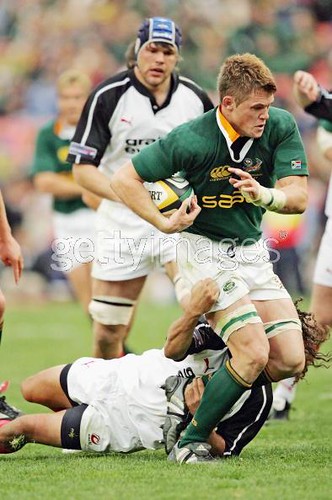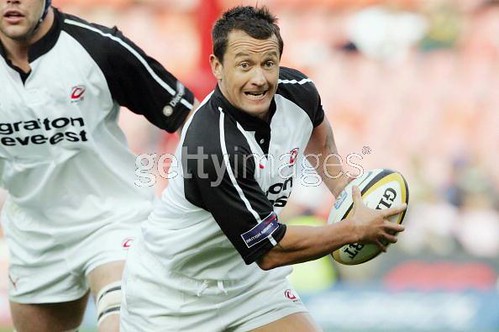The Springbok side needs more black players
The inclusion of Solly Tyibilika in the Springbok Tri-Nations squad has again unleashed a storm of debate.
Affirmative action is an emotive topic. It is a process designed to correct demographic misrepresentation, and is practiced all over the world. Commentary and justification is mixed:
Of course you will realise that I am talking about affirmative action in its broad sense as it is thought of in a UK boardroom, on a Wall Street trading floor or in South Africa.
The South African justification of affirmative action is almost entirely based on the last reason I mentioned above - it is the right thing to do. Fearing that this might not be enough, affirmative action carries legislative backing in our country. This designed to correct past wrongs.
Working in Zimbabwe in 2000, I was struck by the merits of this rationale. Some parts of the economy remained almost colonial, and I was amazed that South Africa appeared to have made more progress in 6 years than they had in 20 years. Left to our own devices, I remain convinced that the change would not have been that great. Indeed, everything I have witnessed in life suggests that the power of inertia is so great that it mitigates change even when that change is beneficial to survival.
Should affirmative action be applied in this context to representative sports teams? That very phrase "representative sports teams" suggests it might. But for many it jars against the thought of such teams containing our best sportsmen and women.
And further indication that it might not belong in sports is supplied by sports such as athletics - a brutal meritocracy if ever there was one. One person against the clock.
The thing is, meritocracies seldom exist in their pure form. Discrimination is always present even if it is subliminal in the mind of those making selection / promotion decisions. Very few situations exist where a set of absolute comparisons such as 400 meter sprint times are available.
It is a fact that if you ask 100 different Springbok rugby supporters for their picks for a team, you will get many different answers.
Bias or discrimination will influence the result, but it goes beyond this. On a subjective assessment of worth and potential, different assessors will arrive at different answers.
And it is interesting when you specifically mention these two criteria - worth and potential. Because the minute you introduce the second, the subjectivity of the decision becomes enormous. Further, by its very nature it discriminates against a pure merit selection.
Stepping back from Springbok rugby, such discussion has interesting parallels in business. For if decisions were made purely on merit, would "stretch roles" ever exist and would young up-and-coming employees ever be given opportunities?
Such decisions as, "I know what Joe can do, and I'd like to give Steve a chance to experience things and show what he can do," speak to point three above. Many a business has crashed as entire elite teams move on or miss the signs of change.
And therefore in business it is entirely justifiable to safely blood new team members.
Is this true at the highest level? In the Springbok team?
Given South African society it is unlikely that the sports team that attracts the amount of money in sponsorship and supporter wealth as the Springboks do can remain a largely white and Afrikaans team. This is true for a few reasons. The first is that politicians are attracted by visibility. This is true around the globe. The second reason is that sponsors are no longer merely catering to the richest pockets and the richest pockets are also no longer totally white-owned. Rugby competes for sponsorship cash with other sports. So reasons 4 and 5 (5 being strongly pushed by politicians) dictate that there will be pressure to make the Springboks a team more representative of South African racial demographics.
But are there not other benefits too? Could reason 3 apply to rugby? Some might argue that should rugby tap into the vast potential in terms of numbers of possible black players, our rugby strength will increase. After all, look at the strength of nations with small populations such as New Zealand and Australia, and consider, if rugby ever takes off there, the fear of a dominant United States given their population and resources. Further, others might argue that there is natural athleticism of the like of Jongi Nokwe waiting to be discovered. Such are the benefits of diversity.
Many will counter this and state that the place for development is at lower levels and the Springboks is no place to establish a nursery.
Perhaps it is a case of push and pull and elements of both arguments have their merits. Few can argue with the pull of Makhaya Ntini on potential black cricket players. And few can argue the need for the development programmes that gave rise to his success.
All the above argument is worth considering and many of us that love rugby have thought and discussed just such rationale.
But when all things are considered, one fact remains. There has never been a country such as South Africa. A country once with legislated racial discrimination. And, when we consider that we once stood on the brink of civil war and that we are watching massive transformation and close to 6% growth today, that there has perhaps never been such a reversal of fortune as there has been in this country.
Given the nation that the Springboks represent, it is not an option for them to be a white team with two black wings.
I was once at a dinner party where a departing emigrant asked me how, if he stayed, he would one-day justify to his son that he had been excluded from a team on reasons other than merit. I shrugged and ignored his need for justification. Because there is no logic. We are South Africa and that comes with a set of circumstances.
It does not serve us to debate whether we need more black players in the Springbok team. It is of far better use to spend our energy figuring out how to find another potential Bryan Habana, Akona and Odwa Ndungane. And when we might have, that is when it time to say, "I think we should give this guy a chance."
It is a shame that our record with growing black players is so poor. It is a shame that players like Tyibilika should hear "supporters" debate the merits of their inclusion or clamour for the coach to clarify whether they are a quota or not. Play the ball and not the player. What possible good can come from ideological debate about a players inclusion. There is no good that can come from a coach admitting a player is a quota. There is no good that can come from asking a coach to justify their selection.
Instead we should be crying over opportunities gone abegging. We should ask why Tim Dlulane, Akona and Odwa Ndungane were not even included in the pre-season squad of 45. We should ask why provinces are not unearthing more black talent. We should ask why provinces bench Springbok black players. Because, the bottom line is, we need more black Springboks.
Affirmative action is an emotive topic. It is a process designed to correct demographic misrepresentation, and is practiced all over the world. Commentary and justification is mixed:
- For some, it is objectionable due to the interference with decisions based on pure merit, for others because they might suffer in its execution.
- For some, all that counts is momentum - if the current team got us there, they'll take us forward.
- For a few, affirmative action promises the benefits of diversity, lessening the danger of a crash caused through a team missing the signals of its own decline.
- For some, affirmative action improves the perception of valuable constituencies.
- And for some, affirmative action represents the right thing to do.
Of course you will realise that I am talking about affirmative action in its broad sense as it is thought of in a UK boardroom, on a Wall Street trading floor or in South Africa.
The South African justification of affirmative action is almost entirely based on the last reason I mentioned above - it is the right thing to do. Fearing that this might not be enough, affirmative action carries legislative backing in our country. This designed to correct past wrongs.
Working in Zimbabwe in 2000, I was struck by the merits of this rationale. Some parts of the economy remained almost colonial, and I was amazed that South Africa appeared to have made more progress in 6 years than they had in 20 years. Left to our own devices, I remain convinced that the change would not have been that great. Indeed, everything I have witnessed in life suggests that the power of inertia is so great that it mitigates change even when that change is beneficial to survival.
Should affirmative action be applied in this context to representative sports teams? That very phrase "representative sports teams" suggests it might. But for many it jars against the thought of such teams containing our best sportsmen and women.
And further indication that it might not belong in sports is supplied by sports such as athletics - a brutal meritocracy if ever there was one. One person against the clock.
The thing is, meritocracies seldom exist in their pure form. Discrimination is always present even if it is subliminal in the mind of those making selection / promotion decisions. Very few situations exist where a set of absolute comparisons such as 400 meter sprint times are available.
It is a fact that if you ask 100 different Springbok rugby supporters for their picks for a team, you will get many different answers.
Bias or discrimination will influence the result, but it goes beyond this. On a subjective assessment of worth and potential, different assessors will arrive at different answers.
And it is interesting when you specifically mention these two criteria - worth and potential. Because the minute you introduce the second, the subjectivity of the decision becomes enormous. Further, by its very nature it discriminates against a pure merit selection.
Stepping back from Springbok rugby, such discussion has interesting parallels in business. For if decisions were made purely on merit, would "stretch roles" ever exist and would young up-and-coming employees ever be given opportunities?
Such decisions as, "I know what Joe can do, and I'd like to give Steve a chance to experience things and show what he can do," speak to point three above. Many a business has crashed as entire elite teams move on or miss the signs of change.
And therefore in business it is entirely justifiable to safely blood new team members.
Is this true at the highest level? In the Springbok team?
Given South African society it is unlikely that the sports team that attracts the amount of money in sponsorship and supporter wealth as the Springboks do can remain a largely white and Afrikaans team. This is true for a few reasons. The first is that politicians are attracted by visibility. This is true around the globe. The second reason is that sponsors are no longer merely catering to the richest pockets and the richest pockets are also no longer totally white-owned. Rugby competes for sponsorship cash with other sports. So reasons 4 and 5 (5 being strongly pushed by politicians) dictate that there will be pressure to make the Springboks a team more representative of South African racial demographics.
But are there not other benefits too? Could reason 3 apply to rugby? Some might argue that should rugby tap into the vast potential in terms of numbers of possible black players, our rugby strength will increase. After all, look at the strength of nations with small populations such as New Zealand and Australia, and consider, if rugby ever takes off there, the fear of a dominant United States given their population and resources. Further, others might argue that there is natural athleticism of the like of Jongi Nokwe waiting to be discovered. Such are the benefits of diversity.
Many will counter this and state that the place for development is at lower levels and the Springboks is no place to establish a nursery.
Perhaps it is a case of push and pull and elements of both arguments have their merits. Few can argue with the pull of Makhaya Ntini on potential black cricket players. And few can argue the need for the development programmes that gave rise to his success.
All the above argument is worth considering and many of us that love rugby have thought and discussed just such rationale.
But when all things are considered, one fact remains. There has never been a country such as South Africa. A country once with legislated racial discrimination. And, when we consider that we once stood on the brink of civil war and that we are watching massive transformation and close to 6% growth today, that there has perhaps never been such a reversal of fortune as there has been in this country.
Given the nation that the Springboks represent, it is not an option for them to be a white team with two black wings.
I was once at a dinner party where a departing emigrant asked me how, if he stayed, he would one-day justify to his son that he had been excluded from a team on reasons other than merit. I shrugged and ignored his need for justification. Because there is no logic. We are South Africa and that comes with a set of circumstances.
It does not serve us to debate whether we need more black players in the Springbok team. It is of far better use to spend our energy figuring out how to find another potential Bryan Habana, Akona and Odwa Ndungane. And when we might have, that is when it time to say, "I think we should give this guy a chance."
It is a shame that our record with growing black players is so poor. It is a shame that players like Tyibilika should hear "supporters" debate the merits of their inclusion or clamour for the coach to clarify whether they are a quota or not. Play the ball and not the player. What possible good can come from ideological debate about a players inclusion. There is no good that can come from a coach admitting a player is a quota. There is no good that can come from asking a coach to justify their selection.
Instead we should be crying over opportunities gone abegging. We should ask why Tim Dlulane, Akona and Odwa Ndungane were not even included in the pre-season squad of 45. We should ask why provinces are not unearthing more black talent. We should ask why provinces bench Springbok black players. Because, the bottom line is, we need more black Springboks.





